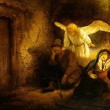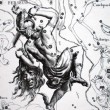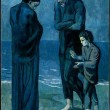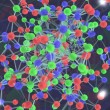Science and Miracles
by Dominicans of the Province of St. Joseph
Filed under Science

On June 20th, 2013, Giovanni Giudici, the Bishop of Pavia, pronounced the cure of Danila Castelli to be miraculous, 24 years after her pilgrimage to Lourdes. Her cure, and the 68 other cures proclaimed miraculous, began as simply one more of the more than 7,000 cures that have been reported to the Medical Bureau of the Sanctuary at Lourdes. While all of the cases are marvelous in their own way, only this small fraction survived the many stages of extensive investigation, both medical and ecclesial,... Read More
Divine Hiddenness and Human Disclosure
by Dominicans of the Province of St. Joseph
Filed under God's Nature, The Existence of God

The agnostic has said in his heart, “If God exists, why doesn’t He make it more obvious, such that it could not be doubted?” Surely, with so much riding on God’s existence (theism, the moral law, salvation, etc.), he could do a little more to make it obvious! Given the stakes, the fact that God fails to make his existence more patent is yet further proof that he doesn’t exist. Travis Dumsday summarizes this objection — often termed the argument from divine hiddenness — as follows: "[O]n... Read More
Science or Myth: A False Dichotomy

“Reality is everything that exists. That sounds straightforward, doesn’t it? Actually it isn’t.” Thus begins Professor Richard Dawkins’ recent book, The Magic of Reality. In order to explain reality, Professor Dawkins takes us on a tour of modern science by contrasting its explanations with those we find in myths and fables: “These are the stories we all remember with fondness from our childhood, and many of us still enjoy when served up in a traditional Christmas pantomime—but... Read More
Molecules and Mourning

Materialism has always had a difficult time dealing with death, because it has to claim that death is not a big deal. If there is nothing more to life than the matter of the body, once the body dies there is nothing left to “experience” death. The ancient atomists were explicit in this claim, with Epicurus stating: "Death, therefore, the most awful of evils, is nothing to us, seeing that, when we are, death is not come, and, when death is come, we are not." While it is debatable how palatable... Read More
Finding God’s Dice

When most people think of Albert Einstein’s contribution to physics, the theory of relativity is what comes to mind, and rightly so. What most don’t realize is that his Nobel Prize was actually awarded for explaining the photoelectric effect, a result which contradicted the classical understanding of light and helped lead to the development of Quantum Mechanics. Despite his major contributions to its development, Einstein was famously uncomfortable with the way randomness and uncertainty became... Read More
Picasso’s Sublime Tragedy
by Dominicans of the Province of St. Joseph
Filed under Art

Pablo Picasso’s Tragedy (1903) depicts three figures huddled on a beach—presumably a family. We see nothing of the ‘tragedy’ itself, however; no trace of specific disaster remains, and we are left to speculate about what series of events may have led to their misfortune. The focus of the painting centers us on the figures themselves. The man and woman are turned inwards in an inherently familial pose, but the distance between them and their downcast eyes reveal their inability to comfort... Read More
Arguing from Authority
by Dominicans of the Province of St. Joseph
Filed under Belief

I once heard it suggested that there’s a sort of joke hidden in the Latin original of the Summa Theologiae that didn’t make it into the commonly used English translation: “the proof from authority is the weakest form of proof,” we read in the Benziger edition (I.1.8.2us), and yet we don’t see the words that follow in the Latin text: “secundum Boëtium.” In the original Latin, you see, Thomas argues that the argument from authority is the weakest form of argument on the basis of the... Read More
A Mind Prepared for Wonder
by Dominicans of the Province of St. Joseph
Filed under Science

I enjoy reading Edward O. Wilson much more than Richard Dawkins, and recently I started to ask myself why this might be. Both are good writers and present difficult scientific concepts in easy-to-understand language. Both work in the controversial area of sociobiology and the evolution of human beings. Both are post-Christian thinkers with little interest in the nuances and delicacies of theological reasoning. What separates these two men? And, even when I don’t agree with him, what makes Wilson... Read More
Cows, Quarks, and Divine Simplicity
by Dominicans of the Province of St. Joseph
Filed under God's Nature

Recently, Cardinal George Pell publicly debated atheist Richard Dawkins on the subject of God’s existence. When Mr. Dawkins was asked about the cause of the universe, and how something could come from nothing, he replied that while his own theory cannot sufficiently answer this question, any answer would be better than something as complex as God. “'Nothing' is very, very, simple,” Dawkins says, “but God as a creative cause is very complex.” Dawkins’ point is that an immaterial God... Read More
Fraught With Purpose
by Dominicans of the Province of St. Joseph
Filed under Cosmology

When something stops working, our first reaction is often to find someone who knows how to fix it. Whether it’s a car, a computer, or a toaster, most of us aren’t inclined to try and tinker around with some machine that we are just as likely to make worse as better. We are all pretty good at telling when something isn’t working right, but it’s far more difficult to discern why. Clearly this piece of technology is designed to do some useful task, and when it stops doing that task, we need... Read More







